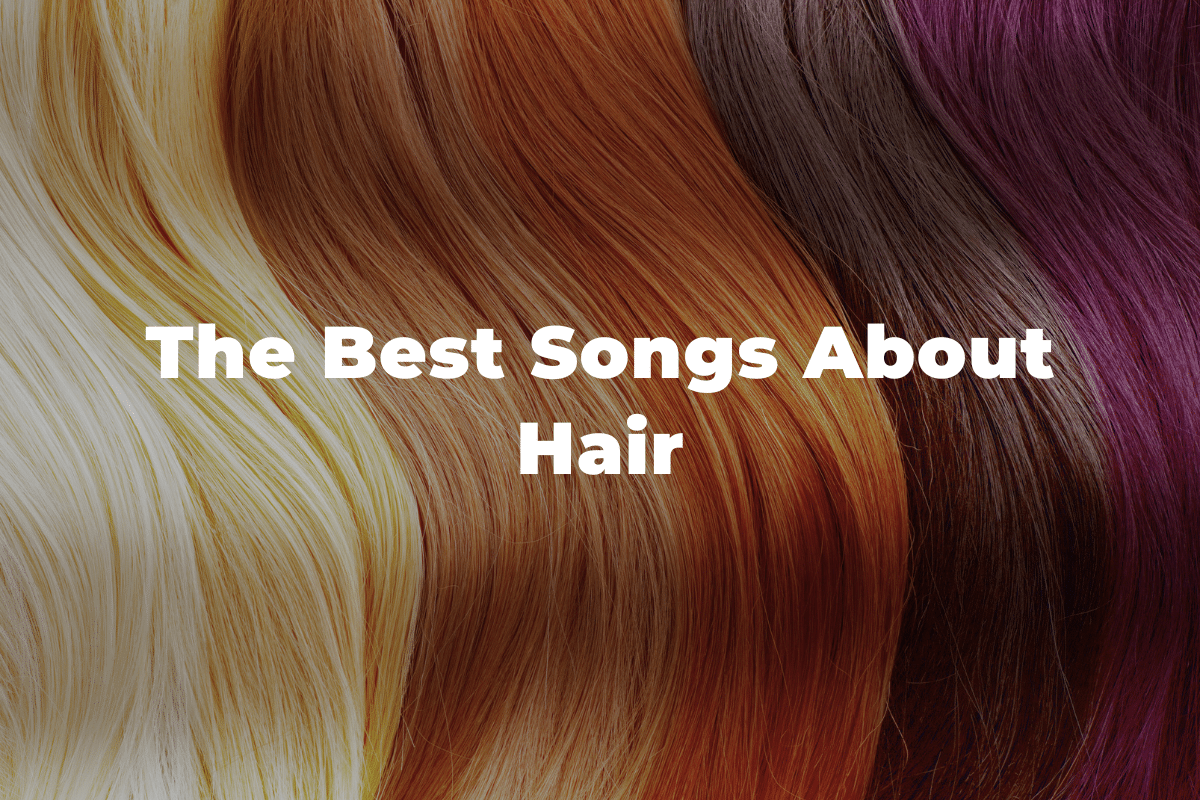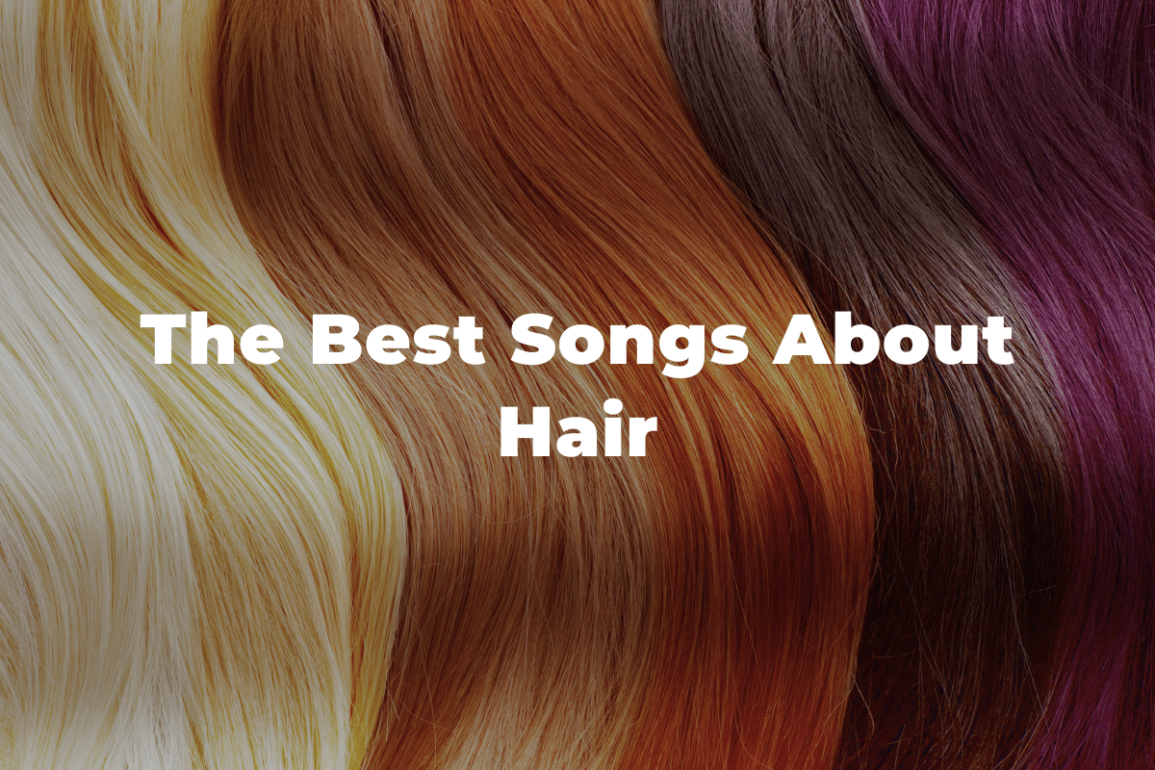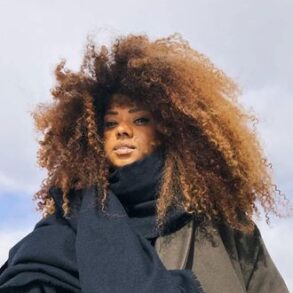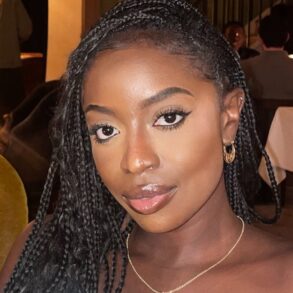
Did you know that hair is a billion-dollar global industry? The fact that there’s more than one kind of shampoo in the supermarket aisles tells us how much thought we put into hair care.
Since time immemorial, humans have proven that hair is more than just a fashion statement. It is a mirror of health, individuality, and personal style. It is also a symbol of activism, strength, and seduction.
No wonder there are a lot of songs written about our crowning glory! And we’re here to help you go through 31 of the best songs about hair. Have fun reading!
1. “Hair” By Lady Gaga
Let’s delve right into the list, starting with Lady Gaga’s “Hair.” Here, she uses hair as a potent symbol of self-expression, freedom, and individuality.
In the lyrics, the narrator shows how her hairstyle can be a form of personal freedom and a way to assert her identity. Gaga pulled from her own experiences when her parents used to object to her hairstyles, lending a personal touch to the narrative.
In the line “I’m as free as my hair,” Gaga explained that hair is the only thing she can change without judgment. Thus, it gives her a sense of control.
2. “I Am Not My Hair” By India.Arie Simpson
Soul and R&B singer-songwriter India.Arie Simpson shares some valuable lessons when it comes to societal norms and perceptions about beauty. “I Am Not My Hair,” released in 2005, asserts that her identity and self-worth are not defined by physical appearance.
India.Arie uses the song to share her journey as a woman navigating through societal pressures. She emphasizes that she is more than her hair. By this, she is countering the belief that a person’s hair or style defines their attractiveness.
With this song, India.Arie also critiques the society that imposes certain hair textures or styles as standards of beauty. What it does is marginalize the ones who do not conform to these norms.
3. “Hair” By Little Mix
One of the songs with “hair” in the title is one that comes from Little Mix‘s Get Weird album. “Hair,” released in 2016, uses hair as a metaphor for moving on and starting anew.
The narrator changing her hair shows her determination to overcome her frustrations from her toxic relationship. A new hairstyle represents a fresh start, with the act of cutting her hair symbolic of cutting off negative influences in her life.
Moreover, the song suggests trying something new to “switch it up.” It implies a change in appearance of attitude, which can do wonders when one is trying to move on from a relationship.
4. “Cut Your Hair” By Pavement
At its core, Pavement‘s “Cut Your Hair” is a satirical critique of the music industry and the societal expectations surrounding it. The title serves as a metaphor for conformity and the pressures that artists face to fit into a specific mold.
The narrator urges the listeners not to give in to these pressures. This is directly addressed in the lines “Darlin’ don’t you go and cut your hair / Do you think it’s gonna make him change?” Cutting one’s hair symbolizes the sacrifices one makes to meet the industry standards in order to succeed.
In essence, “Cut Your Hair” is about the loss of individuality and authenticity in the pursuit of commercial success in the music industry. It’s also an eye-opener to the superficial nature of fame and success.
5. “Black Is the Color Of My True Love’s Hair” By Nina Simone
In our next song, hair serves as a symbol to express deep love for a person. Nina Simone released “Black Is the Color of My True Love’s Hair” as part of her 1959 album Nina Simone at Town Hall.
The black hair of the narrator’s lover represents his distinctive beauty and uniqueness that she admires. Hair is just one of the things that make him special. However, her admiration goes beyond physical attraction. She also holds an emotional connection and profound love for him.
The repeated line, “Black is the color of my true love’s hair,” emphasizes the importance of this attribute. This serves to reinforce the depth of her affection and the intense longing they share for each other.
6. “Hair Up” By Gwen Stefani, Justin Timberlake, And Ron Funches
From Trolls: Original Motion Picture Soundtrack comes “Hair Up” by Gwen Stefani, Justin Timberlake, and Ron Funches. “Hair Up” uses hair as a symbol of joy and self-expression, which reflects the colorful and carefree world of the Trolls.
The lyric “Put your hair in the air (hair up)” encourages us to let loose and have fun! It’s a call to express ourselves freely, much like the creatures do in the film. To put your hair up means letting go of inhibitions and embracing a worry-free attitude.
The song also captures the Trolls’ love for music, dance, and celebration. Here, hair becomes a symbol of a vibrant culture and lifestyle.
7. “Whip My Hair” By Willow Smith
When “Whip My Hair” by Willow Smith was released in 2010, it became an anthem for young girls to remain true to themselves. It uses hair as a metaphor for self-expression and individuality.
When you whip your hair, chances are you’re dancing and having fun. Whipping your hair represents breaking free from restrictions and norms, embracing who you are, and not being afraid to show it.
Thus, this banger promotes self-love and following your own path. It’s a reminder to embrace your whole uniqueness and not let anyone tell you that it’s wrong to do so.
8. “Let My Hair Down” By Nelly Furtado
Up next is “Let My Hair Down” by Nelly Furtado. Released in 2006 from her Loose album, it’s about freedom, self-expression, and authenticity.
In a broader sense, letting our hair down means taking off the masks we usually wear in front of others and being true to ourselves. In the context of the song, the narrator yearns to step away from the pressures of her career or public image.
The repeated line, “Baby I wanna let my hair down,” signifies her desire for freedom and relaxation. To be herself without pretenses.
9. “Hair Too Long” By The Vamps
In “Hair Too Long,” The Vamps use growing one’s hair to represent rebellion and a means to cope with a failed relationship. The song is about a romantic relationship that the narrator wants out of. His partner, sadly, makes him feel bad about himself, leading to self-doubt.
The lyrics “I’ll go out, grow my hair too long / Sing your least favorite song” attest to his defiance. Growing his hair means he’s yearning for a fresh change following the end of his relationship. The song can also symbolize rebellion against the expectations of the relationship.
Whatever the case, the hair is used to convey the emotional turmoil brought about by a failed relationship.
10. “The Girl I Love She Got Long Black Wavy Hair” By Led Zeppelin
In 1997, Led Zeppelin released “The Girl I Love She Got Long Black Wavy Hair” from their album BBC Sessions. The track uses the imagery of a woman’s long, black, and wavy hair as a focal point of attraction.
In the context of the song, the hair can be seen as a symbol of allure and mystery. It’s common in literature and music to use hair as a symbol of beauty, sensuality, and attraction, and this song follows that.
The lyrics suggest that the narrator is attracted to this woman. Her hair seems to have a significant part in that attraction.
11. “Let Your Hair Down” By MAGIC!
The Canadian reggae fusion band MAGIC! released “Let Your Hair Down” in 2014. It was the third single off their album Don’t Kill the Magic and reached #20 on the Canadian Hot 100.
Thematically, the song is all about letting loose and embracing who you are. Hair here represents constraints or inhibitions one might have. There, to let your hair down means embracing freedom, shedding inhibitions, and self-acceptance.
When you let your hair down, you gift yourself with freedom. It provides you with opportunities to be authentic and to live life fully.
12. “Hairdresser On Fire” By Morrissey
When you listen to Morrissey‘s “Hairdresser on Fire,” you can almost feel his frustration. He only wants to get a hold of his hairdressers, to “squeeze” him “into an empty page of your diary.” The song also addresses themes of individuality, longing for connection, and desire to break free.
At one level, Morrissey’s frustration symbolizes his need for change or transformation. And he believes that the hairdressers can bring it about.
On another level, the hairdresser, who has the power to change Morrissey’s appearance, represents salvation or an instrument to bring reinvention.
But just like many songs, anyone can freely assign their own meanings, as many fans have tried to decode “Hairdresser on Fire.”
13. “Flip My Hair” By Jessie James Decker
American country pop singer Jessie James Decker is all about female empowerment in “Flip My Hair.” It was released in 2018 from her album of the same name.
At its core, “Flip My Hair” is a celebration of womanhood, self-confidence, and defiance against societal expectations. The song follows the story of a woman whom others underestimate but ultimately proves them wrong.
By saying “Now watch me flip my hair,” the narrator is demonstrating her defiance against criticisms. She empowers herself and others to accept who they are and what they can accomplish.
14. “Long Blonde Hair” By Laura Bell Bundy
In “Long Blonde Hair,” Laura Bell Bundy sings about an alluring but deceptive woman who appears attractive but has ulterior motives. The song is about this woman who uses her attractiveness, represented by her long blonde hair, to manipulate others and get what she wants.
In the song, the narrator warns about this woman with a “coal black heart.” This suggests that beneath the appealing exterior, there’s a sinister personality. She may look beautiful, but her true intentions are another thing.
In addition, the song hints at deception, where the woman is portrayed as a she-wolf in disguise. Again, this emphasizes the contrast between her attractive exterior and her true nature.
15. “Big Hair” By The Bellamy Brothers
In the 1980s, big hair was a thing, especially among women. In the following decade, the trend became flat hair. However, some girls refused to update their hairstyle and still wore their hair big. The Bellamy Brothers‘ “Big Hair,” released in 1995, is all about it.
The story is told from the perspective of a redneck who is in love with a woman sporting big hair. Despite the changes in trends, he adores her just the way she is, even when the dark roots of her blonde ‘do are already showing.
The lyrics “My baby’s got big hair… / You may not like it son, but I don’t care” prove his affection toward her and her hair. He stands against the judgment of others, showing his admiration for her individuality.
16. “Bad Haircut” By The Squids
Our hair is our crowning glory. And to have it butchered by someone who doesn’t know how to do their job is going to end up in frustration and dissatisfaction. That’s just how the narrator in The Squids‘ “Bad Haircut” feels after getting his hair cut.
The narrative follows someone who is expecting one result but ends up getting something completely different — a bad haircut. The line “I’m gonna kill you for cutting my hair like that” expresses his anger and disappointment at the hairdresser for not meeting his expectations.
In a broader sense, “Bad Haircut” is a commentary on how personal appearance can affect self-esteem. It also shows how a negative change can lead to strong emotional reactions.
17. “Suicide Blonde” By INXS
No, there is no death involved in INXS‘ “Suicide Blonde.” This 1990 song uses the term “suicide blonde” to depict a woman who colors her hair blonde herself. The term comes from the pun “dyed by her own hand,” playing on the phonetic similarity between “dyeing” and “dying.”
The lyrics speak about a woman who is daring and willing to take on challenges. Her decision to dye her hair can be considered an act of rebellion or refusal to conform to societal norms. This shows her adventurous and risk-taking personality.
On the other hand, “Suicide Blonde” also explores themes of attraction and the transit nature of relationships. The narrator is drawn to the suicide blonde. However, he acknowledges that their relationship might not last.
18. “Almost Cut My Hair” By Crosby, Stills, Nash & Young
Like many of the songs on this list, Crosby, Stills, Nash & Young use hair as a symbol of rebellion and non-conformity in “Almost Cut My Hair.” Penned by David Crosby, the track was released in 1970 from their album Déjà Vu.
In the lyrics, the narrator’s experience reflects the conflict that many individuals faced during the hippie era. Are they going to cut their hair to satisfy societal expectations or keep it long as a sign of rebellion?
He has contemplated this matter for a while, leading him to “almost cut my hair.” This suggests that, somehow, he has considered giving in to societal pressures.
19. “Don’t Touch My Hair” By Solange Knowles
Up next, we have “Don’t Touch My Hair” by Solange Knowles. The song mentions “hair” as a metaphor for identity, particularly in the context of Black identity.
At its core, the track is all about setting personal boundaries and expressing cultural pride. The narrator is asking white people not to touch her hair without her consent, which has been a recurring issue. She sees this as a violation of personal space and a form of racial microaggression.
Knowles uses the song to assert her autonomy and reclaim her personal space. She considers her hair an extension of her identity and soul, as addressed in the lyrics, “Don’t touch my hair / When it’s the feelings I wear.”
20. “Braid My Hair” By Mario
In “Braid My Hair” by R&B singer-songwriter Mario, hair is a symbol of comfort, familiarity, and a sense of home. The lyrics find him yearning for simpler times despite his fame and success.
The lyrics suggest that when his woman braids his hair, it makes him feel good and takes him back home. It’s a moment of connection that contrasts with the superficial aspects of fame.
In addition, the song depicts braiding hair as a soothing, grounding experience. It gives him peace amid the chaos of his life.
21. “She’s Always In My Hair” By Prince And The Revolution
Released in 1993, “She’s Always in My Hair” by Prince and the Revolution is an ode to a woman’s constant presence and influence in Prince’s life. The title indicates that she’s always on his mind.
The line “she’s always in my hair” can be interpreted in several ways. One, it could be that the woman is always with him physically. Two, it could mean that she has a profound impact on his feelings and actions.
In essence, “She’s Always in My Hair” talks about the inescapable influence and emotional attachment a particular woman has on Prince. The song uses the imagery of her being in his hair to depict her presence in his life.
22. “Good As Hell” By Lizzo
Our next song, “Good As Hell” by Lizzo, uses hair to convey a message of self-confidence, empowerment, and self-care. The line “I do my hair toss” represents a moment of self-affirmation.
In the lyrics, the narrator experiences a sense of satisfaction and pride in her physical appearance. She is “feeling good as hell,” knowing she looks attractive. This is a form of self-love, telling listeners that taking care of oneself can foster emotional well-being.
At its core, “Good as Hell” is all about the transformative power of self-care, with hair being a symbol of this process. It’s a reminder to feel confident and empowered, and it starts with personal grooming.
23. “I’m Gonna Wash That Man Right Outa My Hair” By Mitzi Gaynor
What to do to a man who’s no longer good for you? As Mitzi Gaynor sings, “I’m Gonna Wash That Man Right Outa My Hair.” This song was penned by Oscar Hammerstein II and Richard Rodgers for the musical South Pacific.
In the lyrics, the narrator uses hair as a metaphor for moving on from a past relationship. She’s intent on forgetting her former lover so she can move forward with her life.
The act of washing her hair symbolizes cleansing herself of everything that has to do with him. It’s a ritual of purification, a way to start fresh without the burden of her past heartbreak.
24. “Baby Let Your Hair Grow Long” By Brian Wilson
If you’re looking for songs about reigniting a flame in a relationship, Brian Wilson‘s “Baby Let Your Hair Grow Long” is for you. Here, hair is a metaphor for wanting to give a relationship another chance.
The title is one’s plea for patience and time. It suggests that if his partner grows her hair long (a process that takes time), then she can give the same amount of time for their love to grow again.
The song is said to have sexual undertones, implying that letting the hair grow is an invitation to intimacy. But it’s not just about physical hair growth. It’s also about emotional growth in the relationship.
25. “Wind In My Hair” By Mandy Moore
From the animated series Tangled: Before Ever After comes the song “Wind in My Hair.” Performed by Mandy Moore playing the character of Rapunzel, it refers to hair as a symbol of freedom and self-discovery.
As we all know, Rapunzel has long magical hair. Having the wind in her hair depicts her longing to explore and experience the world beyond her tower. It’s about feelings of exhilaration and liberation once she finally ventures out into the world.
The wind in her hair also signifies change and uncertainty. Rapunzel shows she is willing to face whatever comes her way, with the wind symbolic of the unknown.
26. “Jesse With The Long Hair Hanging Down” By Robert Earl Keen
Folk singer-songwriter Robert Earl Keen spins a tale of friendship, loyalty, and tragedy in “Jesse with the Long Hair Hanging Down.” The song uses hair as a distinguishing feature to characterize Jesse.
In the lyrics, Jesse’s long hair becomes a symbol of his identity. As his hair is repeated throughout the song, it suggests that it is a significant part of his persona. It can symbolize his free spirit or individualism.
When he marries his beloved at the end, his long hair could also signify a form of domestication without losing his identity. The long hair that once symbolized his free spirit now becomes a part of his new life with his wife.
27. “Southern Curls” By Julie Williams
Our next song is another proof of how hair can be used to represent personal identity and self-expression. Julie Williams‘ “Southern Curls” was released in 2023 from her self-titled album.
The phrase “Southern curls” refers to the narrator’s curly hair. She embraces her hair, along with her dark skin, as a symbol of her Southern roots. In many Southern US cultures, hair has strong symbolic value. It conveys messages about one’s background, values, and lifestyle.
In essence, the song is a celebration of Southern identity, natural beauty, and the strength found in embracing one’s uniqueness.
28. “San Francisco” By Scott McKenzie
In 1967, producers John Phillips and Lou Adler released “San Francisco (Be Sure to Wear Flowers in Your Hair)” to promote their Monterey International Pop Music Festival. The song was penned by Phillips and sung by Scott McKenzie.
This song with hair in the lyrics uses the imagery of flowers in the hair as a symbol of love, peace, and freedom. These values were key in the hippie movement of the 1960s.
The act of wearing flowers is significant. It depicts a sense of unity with nature, embracing individuality and rejecting societal norms. The flowers are seen as a visual representation of these ideas.
29. “Coal War” By Joshua James
Let’s move on to “Coal War” by Joshua James. Released in 2009 from the album Build Me This, it’s a form of protest and commitment.
This is directly addressed in the line, “I ain’t cutting my hair till the good lord comes.” By saying this, the narrator is making a stand, refusing to cut his hair until there is a significant change. He is committed to this cause and is willing to grow his hair indefinitely until the issue is resolved.
The act of cutting hair has been done since time immemorial as a form of protest. It can be seen as a rejection of societal expectations, making it a powerful symbol in this song.
30. “Chick Wit Da Braids” By Mario
Another song by Mario on our list is “Chick Wit Da Braids.” The track uses hair as a symbol of attraction and a defining characteristic.
The title refers to a woman with braids, suggesting that her hair is an important part of her identity and appeal. The narrator expresses his attraction to her despite already being in a relationship with someone else.
In essence, the song uses hair to highlight the allure of individuality and personal style. It paints a picture of a girl who stands out from the crowd, partly due to her hairstyle.
31. “The Haircut Song” By Ray Stevens
Let’s end this list with Ray Stevens‘ “The Haircut Song.” This was released in 1987 from his album Greatest Hits, Vol. 2.
The song humorously recounts what happens when the narrator gets a haircut from a stranger. Each verse of the song tells a different haircut experience. The chorus emphasizes the importance of sticking to “a barber you have known.”
In relation to hair, the song highlights the trust people put in their barbers and the vulnerability of being in the barber’s chair. It underscores the personal connection and familiarity one can have with their hairdressers. At the same time, it showcases the unexpected results one might get when trying a new one.
Summing Up Our List Of Hair Songs
From rock and roll to pop and country, hair serves as the perfect metaphor to express different emotions and narratives. The songs above delved into themes of beauty, self-expression, and even rebellion.
Not only did the songs celebrate the aesthetic appeal of hair. They also showed how hair can be a powerful identifier of one’s individuality.
That’s it for our topic today. This is not a definitive list, so you are more than welcome to suggest more songs to add. We’d love to hear from you!
This post was originally published on this site be sure to check out more of their content.






